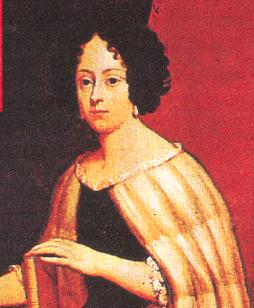Biografía
Elena Cornaro Piscola was born at the Palazzo Loredan, in Venice, on 5 June 1646. She was the daughter of Giovanni Battista Cornaro-Piscopia, procurator of the Venetian republic, and Zanetta Boni, a poor peasant woman who at the time was not legally his wife. As an illegitimate child, under Venetian law she was excluded from any noble privilege, even if her father recognized her. Giovanni and Zanetta were married in 1654, but their children's inferior legal status did not change.
At the age of 7, she began studying Latin and Greek under distinguished teachers, soon becoming fluent in both languages. She also learned Hebrew, Spanish, French, and Arabic, earning her the title "Oraculum Septilingue." Years later, she studied mathematics, astronomy, philosophy and theology.
At the age of 17, she became a virtuous on the harp, harpsichord and violin. Although she was a recognized personality as a composer and soloist, but like her countrywoman María Gaetana Agnesi, her greatest desire was to dedicate herself to charity. Knowledge and charity were the pillars of Elena's life.
In 1665, she took the habits of the Oblate Benedictine order, though without becoming a nun. In 1669, she translated “Colloquio di Cristo nostro Redentore all’anima devota”, by the Carthusian monk Giovanni Laspergio, from Spanish into Italian.
When Elena's fame began to spread, apart from enjoying meetings with personalities and scholars from all over Europe with whom she debated, she was invited to join numerous scholarly societies and, in this way, in 1670, at the age of 24, she was elected president of the Venetian society Accademia dei Pacifici.
It was her father who encouraged her to formalize her apprenticeship at the University of Padua. As Elena enjoyed learning, in 1672 she began her studies in Theology.
During her training, she enjoyed meetings with people from all over Europe, in which debates took place that became famous throughout Venice. Her time in Padua led her to be one of the most influential people in the thought of the time and whose presence attracted a large audience. The philosophical debate in 1677 in which Piscopia, in front of the entire University of Padua, part of the Senate of Venice and many Venetian citizens, confronted Giovanni Gradenigo, Father Caro and G. Fiorello, three respected and illustrious of the time.
It seems that this debate had a lot to do with the fact that she was allowed to access to the Ph.D degree by the University, since that honour had never been granted to a woman.
Piscopia wanted to obtain a doctorate in theology, but such a degree would have directly granted her the right to teach monks, something the church did not allow. Therefore, she opted for a doctorate in philosophy. After a brilliant course, she got her degree.
On 25 June 1678, Cornaro Piscopia graduated from the Cathedral of Padua, in the presence of the university authorities, professors of all faculties, students and the majority of the Venetian senators, along with numerous guests from the universities of Bologna, Perugia, Rome and Naples. The expectation for her exam was such that she had to move from the assembly hall of the University of Padua to the Cathedral. The exhibition was so brilliant that, instead of a secret vote, she received a public ovation and Elena Cornaro Piscopia became the first woman in history to receive a Ph.D degree. Professor Rinaldini proceeded to award her the doctor's badge and the philosophy book, and placed the corresponding laurel wreath on her head, the ring on her finger, and the ermine mozzetta on her shoulders. This scene was captured in the Cornaro Window, located in the west wing of the Thompson Memorial Library at Vassar College in New York.
Now, although Elena's story was of great impact in her time, the opposition to the incorporation of women into the academy was still dominant. In fact, the University of Padua did not award a doctorate to a woman again until 300 years later.
Until her death, Elena dedicated herself to teaching mathematics at the University of Padua to students from all over Europe.
She dedicated the last seven years of her life to study and charity. She died of tuberculosis in Padua on 26 July 1684, at the age of only 38, and was buried in the Basilica of Santa Justina. A statue was erected in her honour at the University of Padua.
The University of Padua established a medal in her honour. Her writings, published in Parma in 1688, consist of scholarly speeches, translations, and religious treatises.
Extracted from Wikipedia (04/01/2022)
Extracted from Women with science (01/04/2022)
